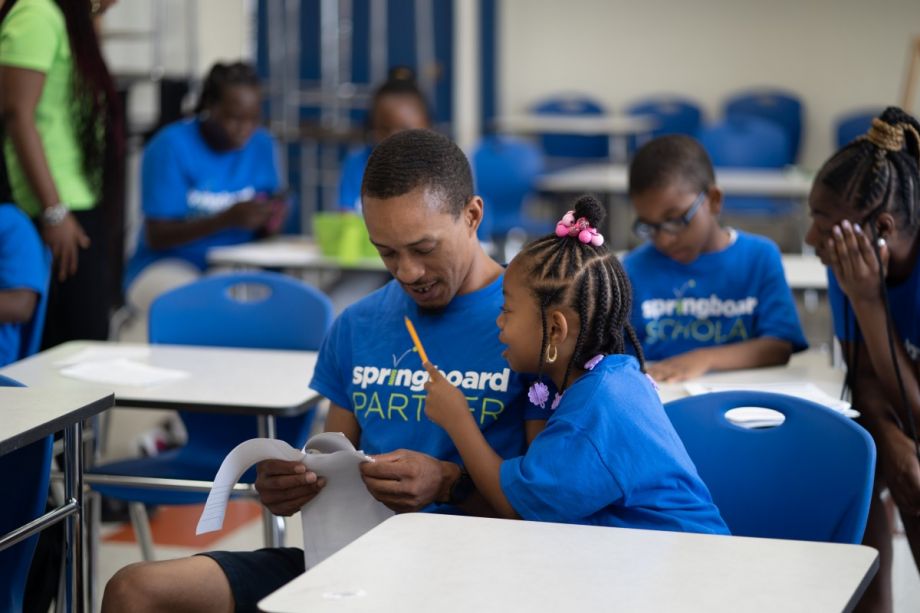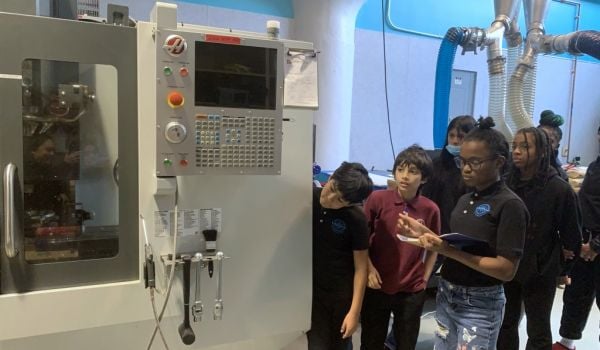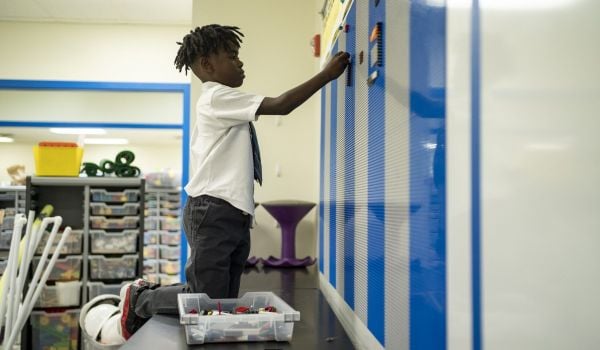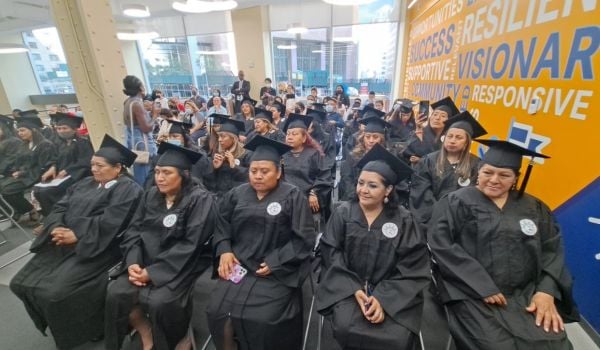Since the onset of the pandemic, most parents haven’t had a choice but to be more involved in their child’s education. But the impacts of remote schooling haven’t been equally felt. Students in majority-Black schools ended last year six months behind in reading; those in majority-Hispanic schools were five months behind. Students from low-income neighborhoods were seven months behind. Meanwhile, those in majority-white schools and in high-income areas were three months behind. A physical return to schools might help with the literacy divide going forward, but the problem existed long before COVID-19. To that end, one organization has been bringing children’s first teachers — their parents and caregivers — into the effort.
Philadelphia-based Springboard Collaborative has been coaching families to be “reading stewards” at home since 2011. The nonprofit currently works with 12 schools and over 500 students in their home region, and also partners with schools from coast to coast. Eighty percent of Springboard’s students are Black or Latinx.
Only 17% of fourth-graders in Philadelphia public schools read at or above “proficient” in 2019, according to National Assessment of Educational Progress standards. (The national number is 34%.) Nearly 70% of students enrolled are from low-income families.
Through a mixture of trainings and workshops with both families and teachers, the organization hopes to close the literacy divide by “closing the gap between home and school.”
Springboard’s interventions can help children improve in reading even when their parents struggle with literacy. (Around a quarter of Philadelphians older than five speak a language other than English at home.) One strategy used by Springboard called the “book walk” doesn’t require the parent to read. A parent chooses an illustrated book and asks their child to point and tell them what they see. (Springboard has e-books for families who don’t have a book at home.) During the book walk, the parent does most of the talking and asks prompting questions like “What do you think is happening on this page?” The parent takes a child through just the pictures, and the child creates an idea of what they think the book is about. Later, the child reads the book and tells the parent if they were correct.
The nonprofit believes that their approach works because children only spend a quarter of their waking hours inside a classroom. “You can picture a child’s time as an orange,” says Alejandro Gibes de Gac, founder and CEO of Springboard Collaborative. “Their classroom experience is a relatively small wedge of that orange and eventually, you’ve squeezed all the juice you can get from that wedge. You have to find a way to juice the rest of the orange.”
According to Katherina Rosqueta, founding executive director for the Center for High Impact Philanthropy at the University of Pennsylvania, involving parents is key. The center is exploring the two-generation approach to early childhood education—and has developed both child and parent interventions. “There is an assumption that parents are not assets. But [children] aren’t independent agents in the world. They are part of families. If you are going to optimize for a child’s learning, you have to make sure that you bring the family along and that you understand the asset that family can be for that child,” Rosqueta says.
So far, the nonprofit’s methods seem to be working. Springboard says its 10-week program has produced over 16 weeks of reading growth; the afterschool program increased reading at home by 49 minutes per week.
In addition to Philadelphia, Springboard has held afterschool programs in over 50 cities so far. Summer and afterschool programs are typically arranged through vendor agreements with schools and school districts. Springboard hosted a summer reading program for 210 African-American K–third-graders in Fresno to bridge the achievement gap for public school students. Springboard met parents where they lived and worked, recruiting families at churches and barbershops. The organization gave bus tokens to parents to attend workshops where they learned to become reading coaches. The school district also ensured buses were available to bring students to the school.
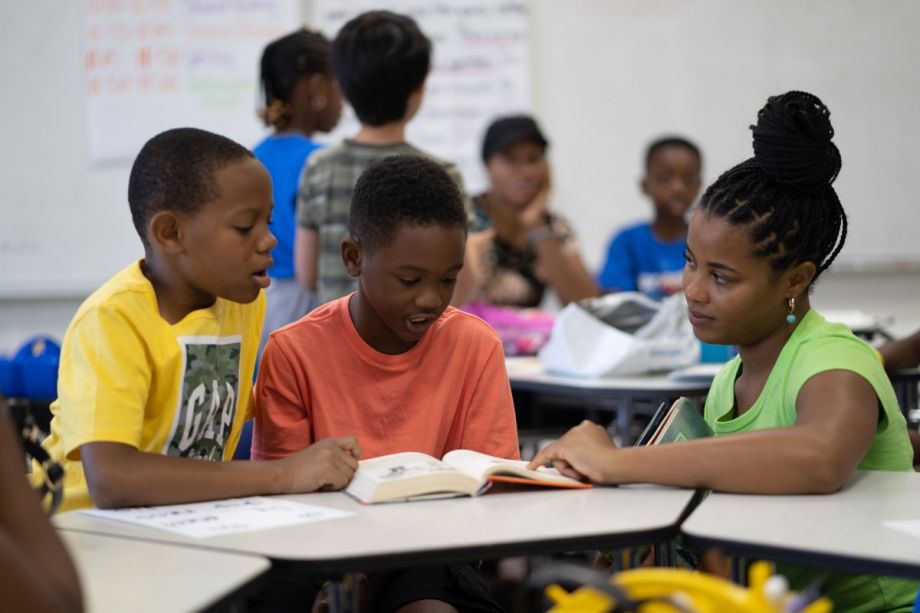
Springboard Collaborative workshops with teachers and families aim to close the literacy divide. (Photo by Ken McFarlane)
Springboard stresses that it’s not trying to be a service parents depend on, but rather a community builder between the home and school. “We don’t want to create a dependency between families and our organizations,” says Gibes de Gac. “What we want to do instead is build the capacity of schools and school systems to fully partner with families around student learning.”
Creating connections between the communities already present in a child’s life helps not only the child but the family too. “We can achieve more in communities,” says Rosqueta. Springboard focuses on family engagement, which means workshops are also opportunities for families to meet other families in the community.
There is a perception that low-income parents are too overburdened to help their children succeed. But this hasn’t been what Springboard has found. The organization’s weekly family workshops prior to the pandemic had an average attendance rate of over 90%. And when these workshops went virtual, attendance remained over 90%.
In 2019, parents in Stamford, Connecticut, where over a third of residents are foreign-born, realized their children were well behind grade-level in reading proficiency. They looked around to neighboring districts for solutions, organized assemblies to educate the community about the literacy gap, and brainstormed ways to bring Springboard into their district. They canvassed neighborhoods, visited laundromats and grocery stores, and stopped parents at bus stops. Thanks to these parents’ advocacy, the district narrowly approved a contract to bring Springboard into their schools.
“Every parent wants their children to thrive and do well,” says Rosqueta. “We just have to meet parents where they are at.”
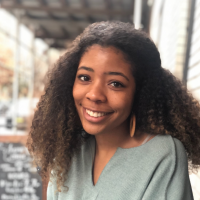
Mia Jackson is a master's student at the Bartlett School of Architecture, University College London. Her writing about cities, health and innovation has appeared in Newsweek, The Daily Beast, The Virginian-Pilot and elsewhere.

